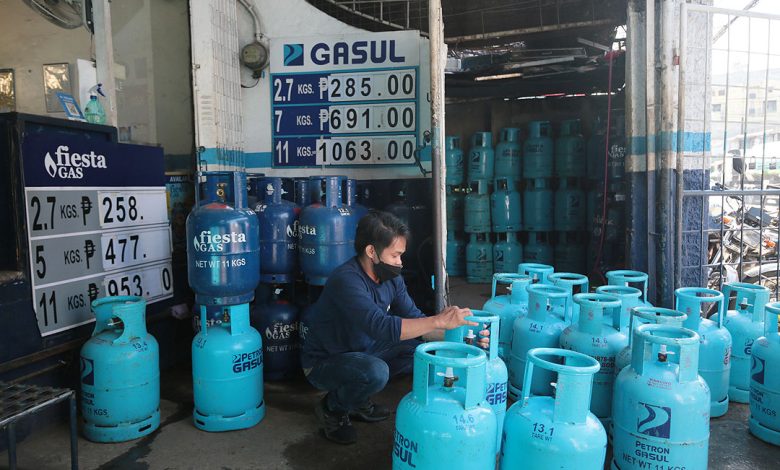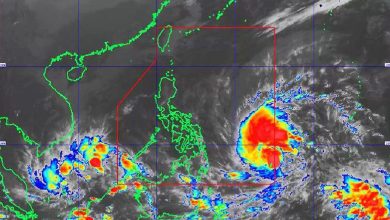Higher oil prices may dampen consumption in Asia, PHL

A worker cleans LPG gas tanks sold at a distributor in Kamuning, Quezon City, March 1. — PHILIPPINE STAR/ MICHAEL VARCAS
THE CONTINUED SURGE in global oil prices driven by the war in Ukraine could affect consumption patterns in Asian countries like the Philippines and may in turn impact economic growth, according to JPMorgan Chase & Co.
“The recent escalation in geopolitical tensions is expected to deliver a shock to commodity prices, centered so far on energy prices and wheat prices. In our baseline scenario, we expect Brent oil prices to lift to an average US$110/bbl (barrel) in Q2 from a prior estimate of around US$90/bbl,” JPMorgan Chief Economist for ASEAN Sin Beng Ong said in a note sent to reporters on Wednesday.
Based on his estimates, a $17 per barrel or 20% increase in oil prices to $110/bbl could mean a 0.4-percentage-point (ppt) reduction in the gross domestic product (GDP) growth of the Philippines.
“For emerging market Asia, we estimate that the first order shock on consumption would trim growth by around 0.2 percentage point, with the largest impact on the Philippines,” Mr. Ong said.
South Korea is expected to suffer a 0.3-ppt reduction in GDP, while the economies of China, India, Malaysia, and Thailand are estimated see a 0.2-ppt drop in GDP.
“In our view, there are two main channels through which an adverse energy price shock would impact the region, the first via a negative real income impact on growth, initially via private consumption, and second, with a lag, through trade, which then affects capital spending,” Mr. Ong said.
He said there will be “a sharp decline in the current account balances, with a 0.4% of GDP hit, with the largest impact on Korea, Taiwan and Thailand.”
“If there are limited offsetting capital inflows or indeed outflows, the net impact would be additional pressure on their balance of payments,” Mr. Ong added.
The rising oil prices and its impact on inflation could affect both consumers and businesses, UnionBank of the Philippines, Inc. Chief Economist Ruben Carlo O. Asuncion said.
“Definitely there will be some cost-push inflation that can soften consumer and business consumption that incidentally are just recovering from the crippling impacts of the coronavirus disease 2019 pandemic,” Mr. Asuncion said in a Viber message.
The economy expanded by 5.6% in 2021 after a record 9.6% contraction in 2020. Household consumption, which makes up about 70% of the economy, rose by 4.2% last year after slumping by 7.9% in 2020.
Economic managers expect the economy to grow by 7-9% this year, but are keeping a close eye on the impact of higher oil prices, especially on transport and agriculture.
President Rodrigo R. Duterte on Wednesday has approved a P3-billion fuel subsidy program for public utility drivers as well as agricultural workers.
Since the start of the year, gasoline, diesel, and kerosene prices per liter rose by P9.65, P11.65, and P10.30.
There are calls to amend the oil deregulation law to include the creation of a strategic petroleum reserve when oil prices are lower.
“This is good because it will soften the blow of any other future oil price shocks,” UnionBank’s Mr. Asuncion said.
Based on JPMorgan estimates, oil and gas accounts for $2.7 billion of the country’s imports.
It also projects that a 20% increase in oil prices will have a 0.8-ppt impact on inflation, given that oil has a 6.9% weight in the Philippine consumer price index.
“Given these shocks, we expect macro-policy to mitigate the price shock via fiscal policy and also for central banks to be more mindful of the growth impact relative to the rise in inflation,” JPMorgan’s Mr. Ong said.
“Thus, central banks may not necessarily respond to the supply-side driven rise in headline inflation, given its negative repercussions for growth, but instead be focused on labor markets and by extension, core inflation, as was the case last year,” he added.
The BSP raised its inflation forecast for the year to 3.7% from 3.4% previously last month amid higher oil and nonoil prices. Still, it kept interest rates at record lows to support growth but stressed they are ready to act in case there is a need to respond to second-round effects of inflation. — Luz Wendy T. Noble




